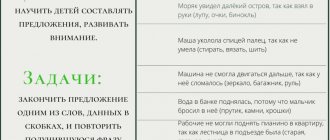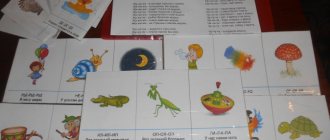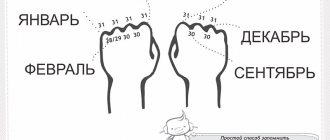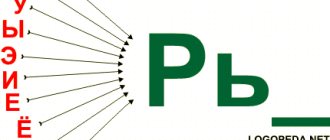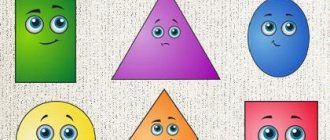The development of speech in children aged 6–7 years leads to the fact that a six-year-old child communicates freely with his peers and adults. If the topic of conversation is familiar to children, they can freely support it, generously sharing their knowledge on the problem and their still small experience.
At this age, intensive development of thinking occurs, which is closely related to the development of speech. A 6-year-old child vitally needs communication with an adult, when he can discuss everything that happens around him: objects, phenomena and relationships with people.
Play is still the main activity for a six-year-old preschooler. Only in the game will he learn and understand new material many times faster than during classes that imitate school lessons. Playing with peers and with older children requires developed speech, otherwise it is very difficult to establish close interaction and satisfy the very important need for a small person to communicate and express emotions. At the end of preschool childhood, speech becomes an important means of communication.
Features of speech of six-year-old children
At this age, the level of children's speech is directly dependent on the speech culture of the adults who surround the preschooler. If the speech of close people is grammatically correct, it often contains vivid epithets, it is rich in content, if adults correct the child’s mistakes in a timely manner, we can say with complete confidence that the child’s speech will have similar qualities.
Lexicon
Children during this period have from three to five thousand words in their active vocabulary. You should not assume that older preschoolers use all this vocabulary in everyday speech; most often, their everyday vocabulary is somewhat more modest. Children do not attach the correct meaning to all words; there are also erroneous interpretations of meanings. Sometimes their speech is clogged with colloquial or slang expressions and phrases.
We must strive to ensure that six-year-old children use words with meaning, use vivid expressions, for example, “in a hurry”, “neither light nor dawn”, know that some words have figurative meanings, for example, “the sun has set”, “ The minutes are passing." The Russian language, despite the fact that it is considered one of the most difficult because of the many rules and exceptions to them, is extremely rich and beautiful. Helping a child master this wealth is the most important task of parents and teachers.
Grammatical structure
Although the speech of a six-year-old child is becoming more and more perfect, there are still errors in it. Children cannot always correctly inflect words by case and number: “no friends”, “many gloves”, “near the houses”. If the word is inflexible, difficulties may also arise with it, for example, “no coat”, “seen in the cinema”. Children's utterances consisting of simple sentences are replaced by complex sentences. For example, “We went for a walk yesterday and saw beautiful water lilies on the lake” or “Give me a car, but not a blue one, but a red one, because it goes faster.”
Teachers working with children and caring parents can already tell which child has the most valuable quality - “a sense of the native language,” when children can spontaneously use new words, change them in accordance with already learned norms and rules, subconsciously focusing on the sound and word form. They enjoy puns when, instead of one meaning of a word, another, similar in sound, is used. Remember the immortal lines about an absent-minded person: “Dearly respected carriage, dear carriage dear! ...Can’t we stop at the tram station?”
Connected speech
This area of children's speech blossoms wildly at the end of preschool childhood. It is not difficult for children to independently retell a work of art, the content of a film, describe an object, a toy, come up with a fairy tale, describe what he feels in different situations. A very useful quality that appears at this age is a sense of foresight, when children can talk about what is about to happen or could happen, but has not happened yet, or come up with a continuation of a story started by adults.
Another achievement is explanatory speech, when it is necessary, for example, to explain to peers the rules of an outdoor game, to agree on roles in a story game or in a tabletop theater performance. This requires special precision of statements and a logical determination of the sequence of actions. For example, when explaining the rules of the game “Third Wheel,” you need to keep in mind the order in which the players are placed, how and under what conditions they change, who is considered the winner, and who is eliminated from the game.
Phonetics of children's speech
The sounds of the native language at this age stage are almost completely pronounced without errors. Children have mastered and clearly pronounce all words, in most cases in accordance with the norms of literary pronunciation. They can speak slowly and quickly (tongue twisters), loudly and quietly, have mastered whispered speech, and widely use intonation.
Occasionally, the following phonetic problems may occur:
- Blurred pronunciation of words and phrases, unclear endings. This defect is most often found in those who have recently mastered the pronunciation of all sounds, and in children with a fast speech rate;
- Fuzzy differentiation of sounds by ear, when a child confuses pairs of sounds: [s]-[ts], [l]-[r], [z]-[zh], [s]-[sh], [ts]-[ h] and others when pronouncing syllable chains, for example, sa-za-sa, la-ra-la, za-za-zha, sa-sha-sa, cha-cha-tsa and others.
- Incorrectly placed emphasis: chauffeur - chauffeur, calls - calls.
At the stage from 6 to 7 years, it is necessary to pay special attention to the formation of phonemic hearing, the ability to do sound analysis: to isolate individual sounds from words, and words from sentences; consistently name sounds in words; determine the place of sound in a word, divide words into syllables. These skills are the basis for learning to read and write; they are more necessary for a child than knowing letters. Without these skills, the child does not read, but mechanically learns syllables and words.
Preparing a preschooler for reading and writing
Despite the fact that the first grade program is designed for children who come to school not knowing a single letter, parents strive for their children to arrive at school already reading and, preferably, writing. They motivate this by the fact that while the child reaches reading fluency, it will not be easy for him to read and understand tasks in other textbooks: in mathematics, on getting to know the world around him.
Unfortunately, we often see how preschool preparation is carried out by those who do not have the slightest idea about the capabilities of children at 6–7 years old. With such “would-be teachers,” the child begins to master reading without having the skills to analyze words, without being able to determine what sounds a word consists of.
“Homework” that is not designed for the capabilities of a preschooler leads children to feel the incredible difficulty of their upcoming studies. After such classes, they come to school with a negative attitude towards the learning process, which initially should have become a source of joy and new emotions for them.
Preparing to Learn Writing
For learning to write, numerous exercises in copybooks are not as important as special tasks for developing fine motor skills and establishing connections between the eye and hand:
- Unfastening and fastening buttons, complex fasteners, lacing;
- Collecting constructor models, for example, Lego, according to the proposed model;
- Weaving from fabric, thread, paper;
- Unscrewing and screwing in children's construction set bolts and screws;
- Hatching, coloring drawings;
- Laying out like a mosaic;
- Writing graphic dictations.
It is desirable that the child is well oriented on the plane of the sheet and can draw a line along the cells up, right, left, down. These skills will come in handy when he begins to master the correct writing of letters and numbers.
Preparing for literacy
You need to start this complex process not with showing letters, but with the ability to hear the sounds of speech. It’s not at all easy to explain to a child what a word is – you can’t touch or see it. You can play word games “Give me a word”, “Finish the line”. When children understand what a word is, they need to be taught to isolate sounds from the word. For this, they also use various games where an adult pronounces words, highlighting some sound. The child’s task is to determine whether this sound is in the word or not.
Gradually making the task more difficult, children are taught to look for these sounds at the beginning, at the end, and in the middle of a word. For sound analysis of a word, you need cards with drawn cells and chips of two colors made of cardboard. You need to start with words that are simple in sound-syllable structure, for example, consisting of three sounds: cat, house, smoke, bow, ball, where these sounds are pronounced clearly and clearly. When pronouncing a word, an adult intonationally emphasizes all sounds in order. The child must name the sound and cover the square with a chip. This work does not tolerate haste and negligence; the intellectual characteristics of the child must be taken into account; the more capable child should be given more complex tasks; the passive child should be offered help without being discouraged from doing the work.
Having consolidated these skills, the adult teaches children to distinguish between vowels and consonants (the pronunciation of some is interfered with by the tongue, lips, teeth, while others are pronounced without interference), soft (lips smile more) and hard, voiced (there is vibration) and dull sounds. Chips for sound analysis of a word are already becoming multi-colored: red (vowels), blue (hard consonants), green (soft consonants). More complex words are already offered for analysis - from 4-5 sounds.
We gradually complicate the tasks, the adult lays out a diagram of the word, and the child must either choose pictures to go with it, or come up with his own word. While playing, you can help with questions that lead to inventing words. We assemble a ladder, come up with a word where the given sound is on the first, second, third, etc. place. We come up with chains, select a word for the last sound, for example, sledge-willow-August-axe-satchel-flowers. And only after a solid mastery of these skills can you begin to get acquainted with letters. To teach syllabic reading it is convenient to use a special manual. These include Chaplygin's cubes and all sorts of objects consisting of a sheet of cardboard with windows through which a strip with vowels and a second with consonants are pulled. The stripes move to form syllables.
This is an important preparatory period that precedes learning to read and write. It is impossible to skip this stage; such exercises help children easily master the skills of reading and error-free writing, which contributes to normal learning according to the school curriculum.
How to help a teenager and an adult with poor diction?
Our center’s specialists also recommend starting with breathing and articulation exercises. Spend at least 10-15 minutes daily on exercises and you will soon see results. But, besides speech physical education, there are proven ways to improve diction.
Reading aloud
Train yourself to read a short text out loud every day. Classes will be more interesting if you train on a collection of humorous stories. O. Henry, Teffi, Hector Hugh Munro, Anton Chekhov - the choice of authors is huge. While reading, pronounce sounds clearly, take your time, pay attention to punctuation marks, and watch intonation. Spend at least half an hour reading aloud.
Tongue twisters, walnuts and pencil
Tongue twisters are a good thing, but they can be a little more complicated if you want quick results. Place one nut on each cheek and try to say a tongue twister, do the exercise for a few minutes. If you don't like walnuts for some reason, use a pencil. Hold it between your teeth and read your favorite poem or tongue twister. By the way, this exercise can be offered to your baby.
Voice recorder and audiobooks
Nowadays every phone has a voice recorder, so recording your speech, for example reading aloud, is not difficult. Listen carefully to the recording and note the sounds that are still difficult for you. Choose tongue twisters where they are practiced. If you like listening to audiobooks, take note of how a professional speaker pronounces the words. Copy his intonation and timbre.
Watch your posture and talk while walking
Due to poor posture, the respiratory organs seem to be in a compressed position. When you straighten your shoulders, your breathing will become calmer, more correct, and it will be easier for you to control it. There is a simple exercise: walk around the room, take a breath and talk, paying attention to your pronunciation.
Norm of speech development in the period from 6 to 7 years
Children of the seventh year of life can easily choose words that are similar in meaning and opposite in meaning. They make excellent use of the capabilities of their voice, they can give their statements different shades of intonation, speak in a whisper, louder and quieter, faster and slower. They easily describe objects, phenomena and features of their relationships with adults and peers.
At this age, they can answer adults’ questions with a complete and detailed answer, putting their thoughts into a clear and precise form. They not only easily retell literary works, but they themselves can compose a fairy tale and story, and come up with a beginning and an end for them. When retelling, these children are consistent and logical, and do not deviate from the main storyline.
In the speech of a 6-7 year old child there are almost no grammatical errors, all sounds are pronounced correctly, speech is clear, words are correctly stressed. Vocabulary allows you to create figurative and vivid statements using interjections and set expressions.
Speech development disorders in children and their prevention
Children with delayed speech development at the age of 6 years are characterized by the following deficiencies in mastering their native language:
- The absence of a large number of sounds or the replacement of some sounds with others, several sound groups may be missing: whistling, hissing, sonorant (r, l);
- Words of 4–6 syllables are pronounced distortedly, they lack sounds and entire syllables, syllables can be rearranged, replaced by others (hammer - hammer, yogurt - post-water milk, traffic controller - allener);
- The vocabulary is poor, there are not enough complex nouns, very few adjectives, a large number of substitutions are noted (cup - mug, stork - heron, strawberry - strawberry, skirt - dress, elk - deer, cooks - cooks, sews - embroiders, big - tall, wide - long);
- Prepositions are often missing from sentences, statements are unclear, and children are unable to voice what they think.
It is very important to limit the deficiencies in the pronunciation of individual sounds from such complex disorders as dysarthria, alalia, general speech underdevelopment, rhinolalia, stuttering, mental retardation. Only a speech therapist together with a neurologist, otolaryngologist, psychologist, and defectologist can determine this accurately. Timely correction of speech pathologies will help the child successfully study in school in the future.
To prevent the speech lag of 6-year-old children from becoming a factor in their future academic failure, care must be taken in advance to stimulate speech development. Children are taught to pronounce proverbs, tongue twisters, sayings, recite poetry, retell works they have read, and dramatize fairy tales. They play various word games with them: “Say the opposite”, “Third is a wheel”, “Living-non-living”, “Say it differently” and others.
If parents want their baby to have meaningful speech, they need to read to him as much as possible, selecting the best works of children's literature for this. Not a single work read should go unnoticed; we need to talk about its content, pay attention to vivid epithets, comparisons, metaphors, and explain the meaning of incomprehensible words. The child is given riddles, asked to make up a story based on the pictures, and to make up a sentence on his own. At the same time, parents carefully monitor their children’s speech, not ignoring any mistakes.
All pronunciation defects must be corrected before school, otherwise difficulties will arise in mastering reading and writing, and you will have to look for a speech therapist who will help overcome problems that could have been avoided before school. We have such specialists, we will be happy to help your child with difficulties in mastering written language, but it is still better to take care of this issue in advance and prevent the problem.
The development of speech at the age of 6–7 years is a clear evidence of the efforts of parents and teachers invested in the development of the child. Mastering speech will help the future first-grader successfully master the school curriculum. Improving speech skills does not end at this age; it will continue throughout a person’s life. A rich vocabulary, correct speech, the ability to express oneself interestingly and convey one’s thoughts to others are a worthy result of a preschooler’s speech development and a solid foundation for a successful start to school life.
What is diction?
Diction is the correct pronunciation of sounds and words, which consists of clear and correct articulation and the ability to control timbre and intonation. Timbre refers to the speed and color of speech; it has been noted that people with poor diction tend to speak hastily. Intonation is the ability to distinguish vowel sounds and stress with the voice.
Articulation will be helped by special exercises, and to improve timbre and intonation it is necessary to do breathing exercises.
